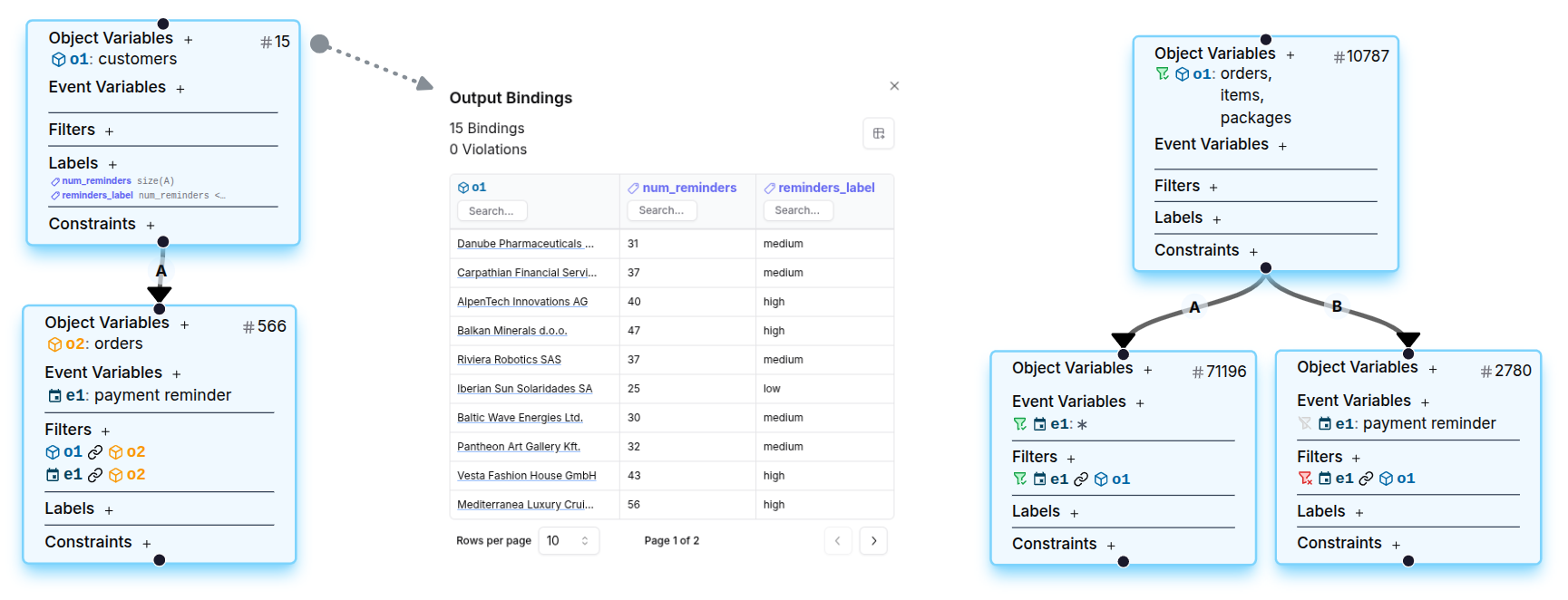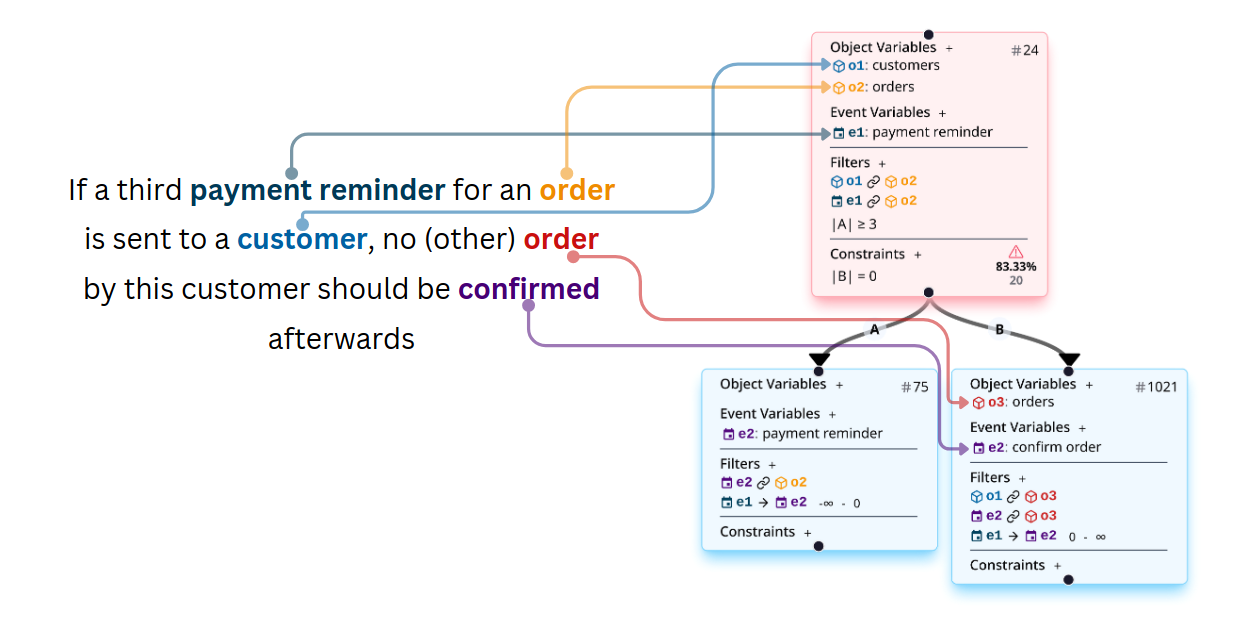Publications
OC-DECLARE: Discovering Object-Centric Declarative Patterns with Synchronization
DOI: 10.1007/978-3-032-02867-9_11
Abstract Real-world processes involve objects of different types that interact with each other, like customers, orders, and items. Accurately representing and analyzing these processes requires object-centric process mining techniques that do not force flattening processes to a single perspective. Most of the object-centric modeling, conformance checking, and discovery approaches presented so far capture little to no interaction between objects and their control flow. However, object synchronization is a fundamental necessity to depict such processes accurately. For example, in an order management process, an order should always be confirmed together with all the items it was placed with. In this paper, we propose an object-centric extension to the traditional DECLARE approach for imposing declarative process rules through a set of constraint template instantiations. Through the use of simple primitives, our approach, OC-DECLARE, can express new types of object-centric constraints. Moreover, the pattern-style representation allows also using and interpreting OC-DECLARE constraints individually, e.g., in prediction tasks. We provide a novel algorithm to automatically discover OC-DECLARE constraints from noisy object-centric event logs, including interactions between objects and synchronization behavior. We evaluate the mining approach on four publicly available object-centric datasets, including one real-life one, and identify patterns and constraints that cannot be found using previous object-centric discovery approaches.
Real-world processes involve objects of different types that interact with each other, like customers, orders, and items. Accurately representing and analyzing these processes requires object-centric process mining techniques that do not force flattening processes to a single perspective. Most of the object-centric modeling, conformance checking, and discovery approaches presented so far capture little to no interaction between objects and their control flow. However, object synchronization is a fundamental necessity to depict such processes accurately. For example, in an order management process, an order should always be confirmed together with all the items it was placed with. In this paper, we propose an object-centric extension to the traditional DECLARE approach for imposing declarative process rules through a set of constraint template instantiations. Through the use of simple primitives, our approach, OC-DECLARE, can express new types of object-centric constraints. Moreover, the pattern-style representation allows also using and interpreting OC-DECLARE constraints individually, e.g., in prediction tasks. We provide a novel algorithm to automatically discover OC-DECLARE constraints from noisy object-centric event logs, including interactions between objects and synchronization behavior. We evaluate the mining approach on four publicly available object-centric datasets, including one real-life one, and identify patterns and constraints that cannot be found using previous object-centric discovery approaches.

Easy and Efficient Object-Centric Process Querying with the OCPQ Tool
Abstract OCPQ is a framework and graphical tool for querying object-centric process data. Traditional process querying relies on case-centric event data, which often cannot represent the multiple interacting objects and perspectives of real-life processes accurately. Querying individual events or cases is no longer sufficient for object-centric data. The OCPQ tool allows more flexible queries for arbitrary combinations of objects and events. Queries are represented graphically as node trees in the OCPQ tool, enabling constructing complex queries visually and without programming experience. The query backend of the tool is implemented in the Rust programming language with a focus on fast execution.
OCPQ is a framework and graphical tool for querying object-centric process data. Traditional process querying relies on case-centric event data, which often cannot represent the multiple interacting objects and perspectives of real-life processes accurately. Querying individual events or cases is no longer sufficient for object-centric data. The OCPQ tool allows more flexible queries for arbitrary combinations of objects and events. Queries are represented graphically as node trees in the OCPQ tool, enabling constructing complex queries visually and without programming experience. The query backend of the tool is implemented in the Rust programming language with a focus on fast execution.

OCPQ: Object-Centric Process Querying and Constraints
DOI: 10.1007/978-3-031-92474-3_23
Abstract Process querying is used to extract information and insights from process execution data. Similarly, process constraints can be checked against input data, yielding information on which process instances violate them. Traditionally, such process mining techniques use case-centric event data as input. However, with the uptake of Object-Centric Process Mining (OCPM), existing querying and constraint checking techniques are no longer applicable. Object-Centric Event Data (OCED) removes the requirement to pick a single case notion (i.e., requiring that events belong to exactly one case) and can thus represent many real-life processes much more accurately. In this paper, we present a novel highly-expressive approach for object-centric process querying, called OCPQ. It supports a wide variety of applications, including OCED-based constraint checking and filtering. The visual representation of nested queries in OCPQ allows users to intuitively read and create queries and constraints. We implemented our approach using (1) a high-performance execution engine backend and (2) an easy-to-use editor frontend. Additionally, we evaluated our approach on a real-life dataset, showing the lack in expressiveness of prior work and runtime performance significantly better than the general querying solutions SQLite and Neo4j, as well as comparable to the performance-focused DuckDB.
Process querying is used to extract information and insights from process execution data. Similarly, process constraints can be checked against input data, yielding information on which process instances violate them. Traditionally, such process mining techniques use case-centric event data as input. However, with the uptake of Object-Centric Process Mining (OCPM), existing querying and constraint checking techniques are no longer applicable. Object-Centric Event Data (OCED) removes the requirement to pick a single case notion (i.e., requiring that events belong to exactly one case) and can thus represent many real-life processes much more accurately. In this paper, we present a novel highly-expressive approach for object-centric process querying, called OCPQ. It supports a wide variety of applications, including OCED-based constraint checking and filtering. The visual representation of nested queries in OCPQ allows users to intuitively read and create queries and constraints. We implemented our approach using (1) a high-performance execution engine backend and (2) an easy-to-use editor frontend. Additionally, we evaluated our approach on a real-life dataset, showing the lack in expressiveness of prior work and runtime performance significantly better than the general querying solutions SQLite and Neo4j, as well as comparable to the performance-focused DuckDB.
